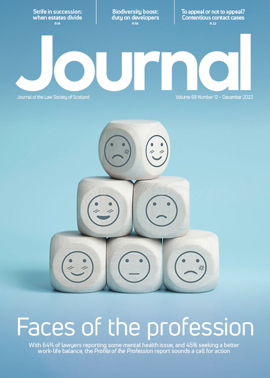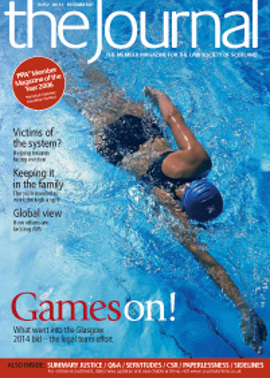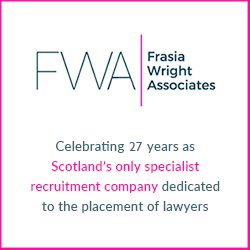Joint conference success

More than 1,000 delegates attended the first series of (six) conveyancing conferences staged jointly by the Law Society of Scotland and Registers of Scotland, during the first fortnight in November. It may be of interest to note some of the material that was covered.
The morning agenda for each conference comprised developments in ARTL, including experiences on the initial commercial use of the system since its live introduction in the early autumn and the strategy for the more widespread rollout from early next year. The afternoon session comprised an update on land reform, and in particular the registration and transactional implications of the feudal abolition and title conditions legislation, along with a recap on the implications of the dematerialisation of the Land Register and the (by the time this is published) new, beefed-up anti-money laundering procedures. In addition there was plenty of time for question and answer sessions built into each part of the agenda.
Dual registration issues
Feedback has been almost universally positive and this will influence the assessment of the conferences with a view to staging a similar series next year.
One of the main issues emerging from the afternoon sessions was the complexity which can arise in dual registration transactions, some of which is only now coming to light and in respect of which representations have been made to the Scottish Law Commission – hopefully for consideration in the context of the current review of the Land Registration (Scotland) Act 1979, which is most of the way through its gestation period in the Commission. Professor George Gretton, who spoke at the Edinburgh conference, is leading that review. The key message remains however that the best way to avoid dual registration issues is to use deeds of conditions to create new burdens.
ARTL: beginning to roll
In terms of ARTL, the feedback from early commercial use (there have now been several hundred security deeds registered through the system) was reprised together with an indication of the strategy for rolling out the system more widely, both for security transactions and also for transfers of title. This feedback, which has been positive, has been supplemented by a stakeholder forum held in Edinburgh in late November.
Readers may wish to note that Registers of Scotland expect to receive from BT (who are building the ARTL system and all the other IT infrastructure projects currently in train within Registers) the transactional module of ARTL in late February next year. Allowing for a brief period of post-delivery testing, we expect that the use of the transactional ARTL system will commence by the end of the first quarter of 2008, if this timescale is maintained.
Final testing of this transactional module has already commenced. Details of the rollout strategy and therefore when firms can expect to be signed up onto the system and issued with the necessary smart cards to allow them to execute the digital signatures, will appear shortly on the ARTL site on Registers of Scotland's website. Readers may also wish to note that this activity will commence in the most mature registration counties first, and follow roughly the same order in which counties became operational on the Land Register. This approach will provide the quickest route to the submission on the ARTL system of registration applications in respect of transactions involving the transfer of title.
We anticipate that the ARTL team will start contacting firms that have an ARTL licence early in the new year to arrange for the sign-up procedure for their digital signatures.
More developments
It also became clear that the new Money Laundering Directive is going to increase the onus on those within firms who are charged with its implementation, and the presentations on this certainly highlighted the need for vigilance and the potentially dire consequences that can result from systematic failure. At a time when land and property is increasingly becoming collateral for criminal organisations, this is a welcome development.
Another development since the conferences is a reminder that to conduct an ARTL transaction, the existing exceptions to rule 5 of the Conflict of Interest Rules apply (for example existing clients) in the same way as they would apply to non-ARTL transactions, and this is something that firms may wish to bear in mind particularly in more rural areas. Accordingly in certain circumstances it may only “take one to tango”.
All the presentations together with detailed texts from the presenters are available on, or linked to, both the Law Society of Scotland and Registers of Scotland’s websites.
CONTACT DETAILS
- Practical ARTL information: www.lawscot.org.uk/Members_Information/convey_essens/artl
- RoS ARTL information:www.ros.gov.uk/artl
- RoS e-services:eservices@ros.gov.uk
tel 0845 607 0160
fax 0131 225 8498
- Professional practice issues: jamesness@lawscot.org.uk
tel 0131 476 8174
- Deputy Keeper: bruce.beveridge@ros.gov.uk
tel 0131 659 6111
In this issue
- Discounting justice
- Common sense prevails
- Common sense prevails (1)
- Shaping the future
- Working in a one-stop shop
- Christmas lesson
- Games City
- OFT-related FAQs
- Sea change around the globe
- Covering the money gap
- Pre-trial priorities
- Personal touch
- Keeping money clean
- The lions sleep tonight
- Conversion course
- Family law risk management
- Too well known to challenge
- Temp sheriffs immune after all
- Camels and common sense
- Tough at the TUPE
- Are bloggers fair game?
- "This ain't tiddlywinks, mate"
- Scottish Solicitors' Discipline Tribunal
- Website reviews
- Book reviews
- Defining moment
- Clear view
- Joint conference success








